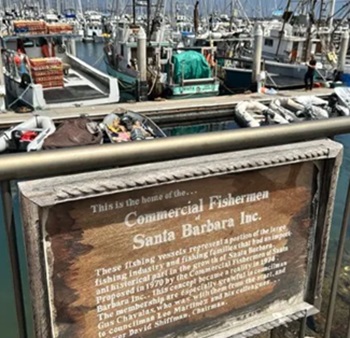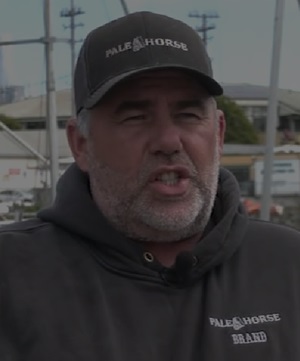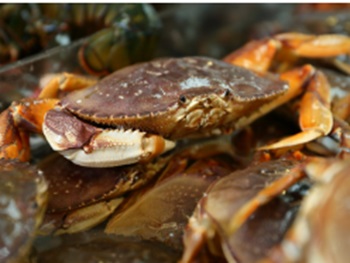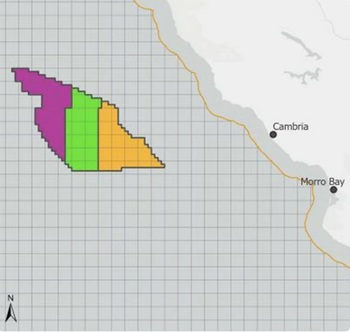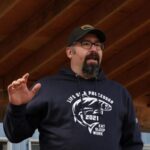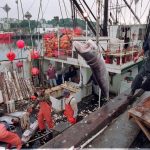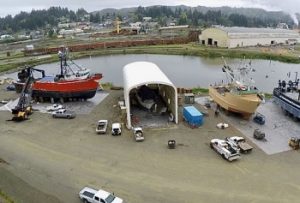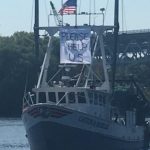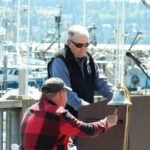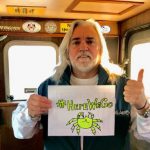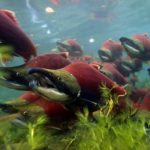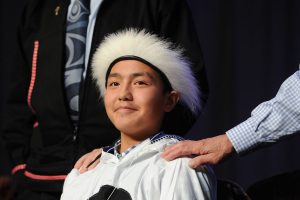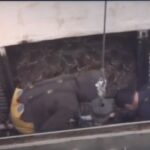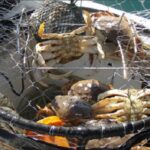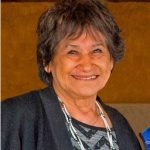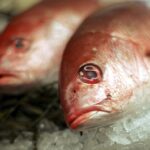Tag Archives: California
‘A massive enterprise’: California’s offshore wind farms are on a fast track
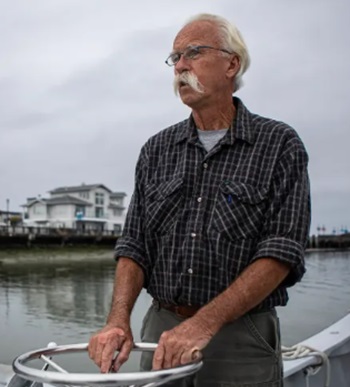 A new gold rush doesn’t begin to describe the urgency of harnessing wind off California when it comes to meeting climate goals. The first, substantial step has been taken: In December 2022, the federal government auctioned off 583 square miles of ocean waters off Humboldt Bay and the Central Coast’s Morro Bay to five energy companies — with more lease sales expected. The five wind farms will hold hundreds of giant turbines, each about 900 feet high, as tall as a 70-story building. But the still-evolving technology of floating wind farms makes it challenging to analyze the viability and impacts of these projects. Experts say a lack of existing data on potential environmental effects means that much of the scientific understanding will only begin after they are operating. A CalMatters analysis shows that California’s offshore wind projects carry a host of implications and uncertainties. Photos, more, >>CLICK TO READ<< 14:07
A new gold rush doesn’t begin to describe the urgency of harnessing wind off California when it comes to meeting climate goals. The first, substantial step has been taken: In December 2022, the federal government auctioned off 583 square miles of ocean waters off Humboldt Bay and the Central Coast’s Morro Bay to five energy companies — with more lease sales expected. The five wind farms will hold hundreds of giant turbines, each about 900 feet high, as tall as a 70-story building. But the still-evolving technology of floating wind farms makes it challenging to analyze the viability and impacts of these projects. Experts say a lack of existing data on potential environmental effects means that much of the scientific understanding will only begin after they are operating. A CalMatters analysis shows that California’s offshore wind projects carry a host of implications and uncertainties. Photos, more, >>CLICK TO READ<< 14:07
Biden-Harris Administration Announces More Than $105 Million for West Coast and Alaska Salmon
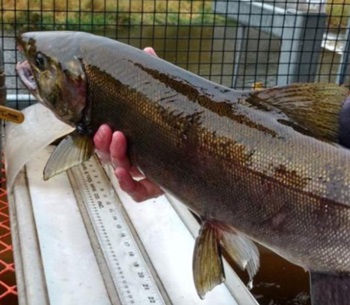 Today, the Department of Commerce and NOAA announced more than $105 million in recommended funding for 14 new and continuing salmon recovery projects and programs. Located along the West Coast and in Alaska, these state and tribal efforts will be funded through the Pacific Coastal Salmon Recovery Fund (PCSRF). The funds include Fiscal Year 2024 annual appropriations as well as $34.4 million under the Bipartisan Infrastructure Law and $7.5 million under the Inflation Reduction Act, and will aid programs and projects in Alaska, California, Idaho, Oregon and Washington that include habitat restoration, stock enhancement, sustainable fisheries and research and monitoring. “This $105 million investment, made possible thanks to the Biden-Harris Administration’s Investing in America agenda, will build on decades of salmon recovery work, while helping Pacific coast Tribes and Alaska Natives sustain their communities and cultural traditions in the face of climate change,” said U.S. Secretary of Commerce Gina Raimondo. “This is a result of the most ambitious climate agenda in history, and I am proud that nearly half of all funds in this announcement are being awarded to Tribal applicants.” more, >>CLICK TO READ<< 17:55
Today, the Department of Commerce and NOAA announced more than $105 million in recommended funding for 14 new and continuing salmon recovery projects and programs. Located along the West Coast and in Alaska, these state and tribal efforts will be funded through the Pacific Coastal Salmon Recovery Fund (PCSRF). The funds include Fiscal Year 2024 annual appropriations as well as $34.4 million under the Bipartisan Infrastructure Law and $7.5 million under the Inflation Reduction Act, and will aid programs and projects in Alaska, California, Idaho, Oregon and Washington that include habitat restoration, stock enhancement, sustainable fisheries and research and monitoring. “This $105 million investment, made possible thanks to the Biden-Harris Administration’s Investing in America agenda, will build on decades of salmon recovery work, while helping Pacific coast Tribes and Alaska Natives sustain their communities and cultural traditions in the face of climate change,” said U.S. Secretary of Commerce Gina Raimondo. “This is a result of the most ambitious climate agenda in history, and I am proud that nearly half of all funds in this announcement are being awarded to Tribal applicants.” more, >>CLICK TO READ<< 17:55
A Fishing Vessel Ran Aground at the Sonoma Coast. Could It Have Been Saved?
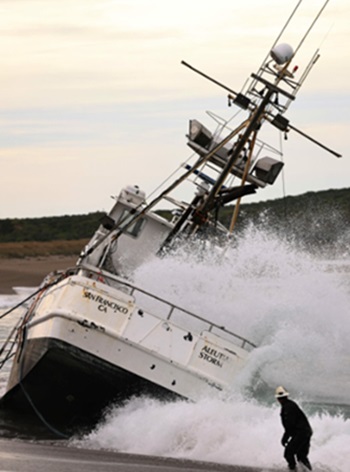 It was nearing midnight and too dark for captain Chris Fox to see the land or determine how far offshore he was. But he knew he was too close. The water was shallow. The F/V Aleutian Storm was on a sandbar. Fox needed help. The engine and all other onboard systems were still working, but Fox knew he could hold the 57-ton fishing vessel only so long before the waves drove it ashore. Fox radioed the U.S. Coast Guard for help, which wasn’t immediately forthcoming—not in the way he had hoped, at least. The February loss of the Aleutian Storm is the latest controversy surrounding the Coast Guard’s local response to grounded vessels. While the details of each emergency are unique, they are viewed with similar frustration and pain by some who believe more could—and should— have been done to save them from breaking apart on land. Still, critics like veteran Fort Bragg fisherman Chris Iversen, a friend of Fox’s, sense déjà vu in the pattern of lost vessels—each briefly in a position for a possible save only to later run aground. Photos, more, >>CLICK TO READ<< 14:34
It was nearing midnight and too dark for captain Chris Fox to see the land or determine how far offshore he was. But he knew he was too close. The water was shallow. The F/V Aleutian Storm was on a sandbar. Fox needed help. The engine and all other onboard systems were still working, but Fox knew he could hold the 57-ton fishing vessel only so long before the waves drove it ashore. Fox radioed the U.S. Coast Guard for help, which wasn’t immediately forthcoming—not in the way he had hoped, at least. The February loss of the Aleutian Storm is the latest controversy surrounding the Coast Guard’s local response to grounded vessels. While the details of each emergency are unique, they are viewed with similar frustration and pain by some who believe more could—and should— have been done to save them from breaking apart on land. Still, critics like veteran Fort Bragg fisherman Chris Iversen, a friend of Fox’s, sense déjà vu in the pattern of lost vessels—each briefly in a position for a possible save only to later run aground. Photos, more, >>CLICK TO READ<< 14:34
Santa Cruz salmon fishermen facing challenges keeping afloat
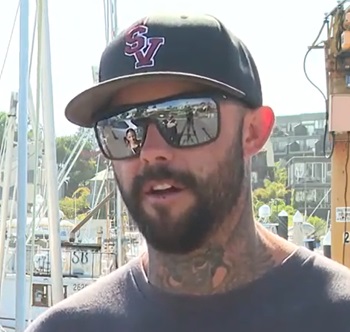 The abrupt end of salmon season, announced on April 10, has left commercial fishermen across the Central Coast grappling with economic fallout and seeking alternative income sources. “It’s frustrating to see, and I’m losing faith that we might ever even have salmon season again,” said Heidi Rhodes, CEO of H&H Fresh Fish Market. “It’s just been honestly catastrophic. We’re all waiting, just trying, hoping some federal disaster relief will come. It’s been really hard to stay afloat,” added Rhodes. In February, the U.S. Department of Commerce announced an allocation of over $20.6 million in fishery disaster funding for last year’s closure. “The disaster relief doesn’t make anyone money; it’s a band-aid on a wound that can’t stop bleeding,” said local fisherman Tim Obert. Video, more, >>CLICK TO READ<< 10:19
The abrupt end of salmon season, announced on April 10, has left commercial fishermen across the Central Coast grappling with economic fallout and seeking alternative income sources. “It’s frustrating to see, and I’m losing faith that we might ever even have salmon season again,” said Heidi Rhodes, CEO of H&H Fresh Fish Market. “It’s just been honestly catastrophic. We’re all waiting, just trying, hoping some federal disaster relief will come. It’s been really hard to stay afloat,” added Rhodes. In February, the U.S. Department of Commerce announced an allocation of over $20.6 million in fishery disaster funding for last year’s closure. “The disaster relief doesn’t make anyone money; it’s a band-aid on a wound that can’t stop bleeding,” said local fisherman Tim Obert. Video, more, >>CLICK TO READ<< 10:19
Salvage crews complete recovery of Aleutian Storm, and find a surprise
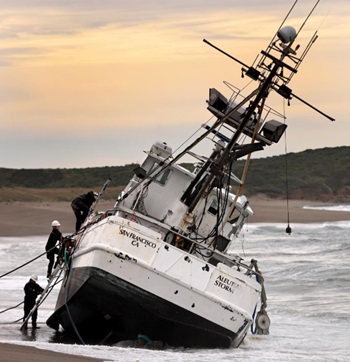 The last of the wreckage of the Aleutian Storm has been hauled away from south Salmon Creek Beach after final salvage operations that yielded a surprise about the boat’s construction that helps explain some of the challenges when it ran aground. An unusual, 4-inch thick and 4-foot-wide slab of steel that ran 36 feet along the bottom of the commercial fishing vessel’s keel may be the reason it was immovable after it grounded in the surf Feb. 9 south of Bodega Dunes Campground, a representative of Parker Diving Service said. “It anchored that vessel into the sand so when they were either trying to turn it and pull back to sea in those first couple of days and have a tug tow it, it kept snapping the line,” Nunn said. “I know the owner tried desperately to get it back to sea.” Photos, more, >>CLICK TO READ<< 06:31
The last of the wreckage of the Aleutian Storm has been hauled away from south Salmon Creek Beach after final salvage operations that yielded a surprise about the boat’s construction that helps explain some of the challenges when it ran aground. An unusual, 4-inch thick and 4-foot-wide slab of steel that ran 36 feet along the bottom of the commercial fishing vessel’s keel may be the reason it was immovable after it grounded in the surf Feb. 9 south of Bodega Dunes Campground, a representative of Parker Diving Service said. “It anchored that vessel into the sand so when they were either trying to turn it and pull back to sea in those first couple of days and have a tug tow it, it kept snapping the line,” Nunn said. “I know the owner tried desperately to get it back to sea.” Photos, more, >>CLICK TO READ<< 06:31
What does a California ban on salmon mean for the livelihood of fishermen?
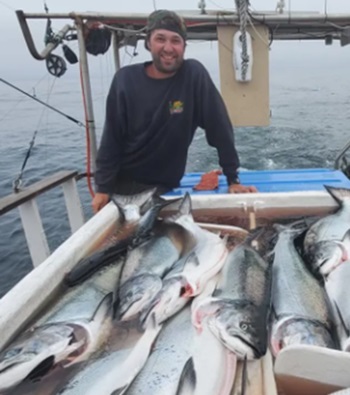 This time of year, Ben Hyman of Wild Local Seafood would like to be out on a boat, fishing for salmon. But for the second year in a row, federal fishery managers have closed all salmon fishing in California. The decision has devastated the state’s fishermen. “The Sacramento River system and the various rivers that stem from it are major producers of king salmon. Some of the largest runs in the world, and especially on the West Coast, have [come] from this river system,” Hyman says. “A lot of the fishing seasons are determined by how many fish make their way up the rivers. “Last year’s closure cost California fishermen approximately $45 million, with some sources saying that is only a fraction of the loss. Hyman says many of his colleagues have left the industry, including third-generation fishermen and those in the business for more than 50 years. more, >>CLICK TO READ<< 07:42
This time of year, Ben Hyman of Wild Local Seafood would like to be out on a boat, fishing for salmon. But for the second year in a row, federal fishery managers have closed all salmon fishing in California. The decision has devastated the state’s fishermen. “The Sacramento River system and the various rivers that stem from it are major producers of king salmon. Some of the largest runs in the world, and especially on the West Coast, have [come] from this river system,” Hyman says. “A lot of the fishing seasons are determined by how many fish make their way up the rivers. “Last year’s closure cost California fishermen approximately $45 million, with some sources saying that is only a fraction of the loss. Hyman says many of his colleagues have left the industry, including third-generation fishermen and those in the business for more than 50 years. more, >>CLICK TO READ<< 07:42
Fresh Off the Boat
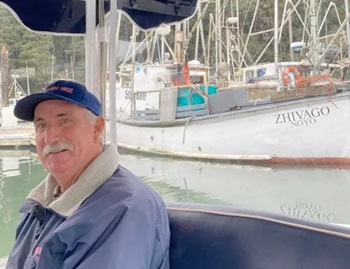 California fisheries are considered a “Legacy Industry” that sustains local families while helping to attract tourists. Shockingly, the California commercial fleet that included 5,000 boats in 1980 diminished to only 464 vessels by 2022, and Fort Bragg is home to 103 of these registered commercial fishing boats. The fish catchers who are still fishing are finding it increasingly necessary to “adapt or die.” Fortunately, Noyo Harbor seems to have some very resourceful people who have taken this challenge to heart and devised some innovative ways to help get the freshest fish onto your dinner table. Dan Platt, aka Captain Dan, is a commercial fisherman, diver, and owner of Noyo Harbor Tours in Fort Bragg. He owns two boats: the Zhivago, a converted 1931 former Coast Guard craft for fishing, and The Noyo Star, his eco-friendly electric tour boat. The recent tough times in California fisheries encouraged Dan to think outside the box. To improve his bottom line, he is sometimes able to sell his fish direct from his boat to customers on the dock, cutting out the middleman. more, >>CLICK TO READ<<10:20
California fisheries are considered a “Legacy Industry” that sustains local families while helping to attract tourists. Shockingly, the California commercial fleet that included 5,000 boats in 1980 diminished to only 464 vessels by 2022, and Fort Bragg is home to 103 of these registered commercial fishing boats. The fish catchers who are still fishing are finding it increasingly necessary to “adapt or die.” Fortunately, Noyo Harbor seems to have some very resourceful people who have taken this challenge to heart and devised some innovative ways to help get the freshest fish onto your dinner table. Dan Platt, aka Captain Dan, is a commercial fisherman, diver, and owner of Noyo Harbor Tours in Fort Bragg. He owns two boats: the Zhivago, a converted 1931 former Coast Guard craft for fishing, and The Noyo Star, his eco-friendly electric tour boat. The recent tough times in California fisheries encouraged Dan to think outside the box. To improve his bottom line, he is sometimes able to sell his fish direct from his boat to customers on the dock, cutting out the middleman. more, >>CLICK TO READ<<10:20
Commercial salmon fishermen eye Klamath dam removal with cautious hope
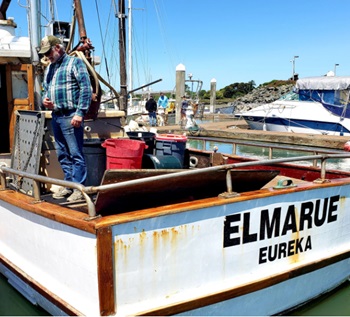 At 76, he still fishes for salmon alone. Standing in the cockpit on the stern deck of his wooden trawler, Elmarue, he can keep an eye on all six wires; when one of the lines starts to dance, he brings the fish in, stunning it with his gaff while it’s still in the water. Then he uses the tool to hook the salmon behind the gills and swings it onto the deck. “By the way, I want that fish cleaned and chilling in a single water flush within half an hour; that’s the standard,” says Dave Bitts. “I want you to enjoy eating it as much as I enjoyed catching it.”In April, for the second year in a row, the Pacific Fishery Management Council voted unanimously to close California’s commercial and recreational ocean salmon fishery. The closure was based on woefully low numbers of adult salmon expected to return to several California rivers. more, >>CLICK TO READ<< 12:58
At 76, he still fishes for salmon alone. Standing in the cockpit on the stern deck of his wooden trawler, Elmarue, he can keep an eye on all six wires; when one of the lines starts to dance, he brings the fish in, stunning it with his gaff while it’s still in the water. Then he uses the tool to hook the salmon behind the gills and swings it onto the deck. “By the way, I want that fish cleaned and chilling in a single water flush within half an hour; that’s the standard,” says Dave Bitts. “I want you to enjoy eating it as much as I enjoyed catching it.”In April, for the second year in a row, the Pacific Fishery Management Council voted unanimously to close California’s commercial and recreational ocean salmon fishery. The closure was based on woefully low numbers of adult salmon expected to return to several California rivers. more, >>CLICK TO READ<< 12:58
RWE to start seabed surveys at floating wind site offshore California
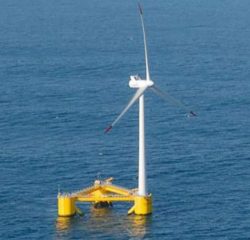 Site investigation survey work will soon start at RWE’s floating wind project site off the coast of Northern California, where the Germany-based offshore wind developer plans to build its first commercial-scale floating offshore wind farm, Canopy. RWE will be performing initial site investigation surveys during 2024 and 2025, with the first activities beginning in June 2024. The work will involve mapping the seafloor so the best locations for the wind turbines, anchors and electric cables can be assessed. The surveys will also provide data that will help better understand biodiversity, habitats, and other environmental factors to ensure responsible planning and design that minimizes the impact on ocean ecosystems, according to the developer. more, >>CLICK TO READ<< 08:11
Site investigation survey work will soon start at RWE’s floating wind project site off the coast of Northern California, where the Germany-based offshore wind developer plans to build its first commercial-scale floating offshore wind farm, Canopy. RWE will be performing initial site investigation surveys during 2024 and 2025, with the first activities beginning in June 2024. The work will involve mapping the seafloor so the best locations for the wind turbines, anchors and electric cables can be assessed. The surveys will also provide data that will help better understand biodiversity, habitats, and other environmental factors to ensure responsible planning and design that minimizes the impact on ocean ecosystems, according to the developer. more, >>CLICK TO READ<< 08:11
Sonoma County Offers Marina Fee Waiver As Salmon, Crab Seasons Nixed
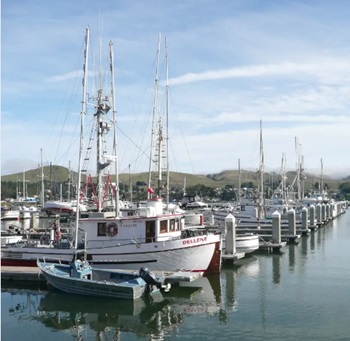 The Sonoma County Board of Supervisors is offering a lifeline to the local commercial fishing community devastated by the canceled salmon and shortened Dungeness crab seasons, Sonoma County Regional Parks announced Monday. The board authorized the Bodega Bay Marina Temporary Fee Waiver Program, which provides monthly dock fee waivers at three marinas operated by the county. Waivers are offered to active commercial fishermen and charter fishing vessels who can show evidence of six commercial landings between 2021 and 2023. more, >>CLICK TO READ<< 09:09
The Sonoma County Board of Supervisors is offering a lifeline to the local commercial fishing community devastated by the canceled salmon and shortened Dungeness crab seasons, Sonoma County Regional Parks announced Monday. The board authorized the Bodega Bay Marina Temporary Fee Waiver Program, which provides monthly dock fee waivers at three marinas operated by the county. Waivers are offered to active commercial fishermen and charter fishing vessels who can show evidence of six commercial landings between 2021 and 2023. more, >>CLICK TO READ<< 09:09
Retired Commercial Fisherman Captain Nick Mosich has passed away
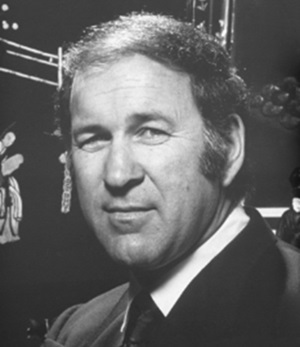 For over thirty years the fishing vessel Mauritania patrolled the Eastern Pacific searching for tuna to bring home to market. At the helm was Captain Nick Mosich. He was hardworking, practical, and stoic. Always among the top producers, he was admired for his devotion and skill in his never-ending pursuit for tuna. His father was a fisherman, and his mother a homemaker. In 1949, he left Loyola to join his father in the fishing industry, where they worked side by side for a decade. In 1950, he met and married the love of his life, Barbara. They went on to have two children, and he was a dedicated family man.In 1960, Nick became owner of F/V Mauritania. At the time, the vessel was a bait boat, meaning it fished for tuna using bait and poles. The boat was converted to a purse seiner and for over thirty years he sought schools of tuna from Mexico to Peru. More than a fishing savant, Nick was devoted to his crew, and treated them as family. more, >>CLICK TO READ<< 13:37
For over thirty years the fishing vessel Mauritania patrolled the Eastern Pacific searching for tuna to bring home to market. At the helm was Captain Nick Mosich. He was hardworking, practical, and stoic. Always among the top producers, he was admired for his devotion and skill in his never-ending pursuit for tuna. His father was a fisherman, and his mother a homemaker. In 1949, he left Loyola to join his father in the fishing industry, where they worked side by side for a decade. In 1950, he met and married the love of his life, Barbara. They went on to have two children, and he was a dedicated family man.In 1960, Nick became owner of F/V Mauritania. At the time, the vessel was a bait boat, meaning it fished for tuna using bait and poles. The boat was converted to a purse seiner and for over thirty years he sought schools of tuna from Mexico to Peru. More than a fishing savant, Nick was devoted to his crew, and treated them as family. more, >>CLICK TO READ<< 13:37
SLO County judge rules against local fishermen
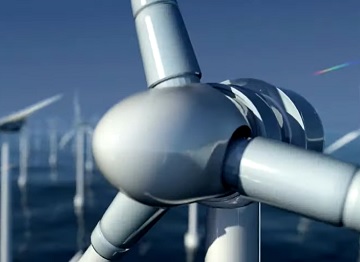 A San Luis Obispo County judge last week rejected a request from Morro Bay and Port San Luis fishermen for a preliminary injunction to stop wind energy companies from surveying the ocean floor. Signed into law in Oct. 2023, Senate Bill 286 requires the statewide strategy for wind energy to include best practices for addressing impacts to commercial and recreational fisheries. Local fishermen argue wind companies have failed to follow best practices because they have not put protocols in place to protect the fishing industry. San Luis Obispo Superior Court Judge Craig van Rooyen found the requirements in Senate Bill 286 vague. Specifically, when the protocols and protections need to be in place: before or after work is completed. more, >>CLICK TO READ<< 08:48
A San Luis Obispo County judge last week rejected a request from Morro Bay and Port San Luis fishermen for a preliminary injunction to stop wind energy companies from surveying the ocean floor. Signed into law in Oct. 2023, Senate Bill 286 requires the statewide strategy for wind energy to include best practices for addressing impacts to commercial and recreational fisheries. Local fishermen argue wind companies have failed to follow best practices because they have not put protocols in place to protect the fishing industry. San Luis Obispo Superior Court Judge Craig van Rooyen found the requirements in Senate Bill 286 vague. Specifically, when the protocols and protections need to be in place: before or after work is completed. more, >>CLICK TO READ<< 08:48
Rare ‘football fish’ washes up near Cannon Beach
 A deep-sea angler fish, called a Pacific football fish (Himantoliphus sagamius) has been found by local beachcombers just south of Cannon Beach. Living in complete darkness, at 2,000 to 3,300 feet, these fish are rarely seen. In fact, only 31 specimens have been recorded around the world. While a handful of football fish have been recorded in New Zealand, Japan, Russia, Hawaii, Ecuador, Chile and California, this is the first one reported on the Oregon Coast to the knowledge of personnel at Seaside Aquarium, who announced the find. Photos, more, >>CLICK TO READ<< 10:38
A deep-sea angler fish, called a Pacific football fish (Himantoliphus sagamius) has been found by local beachcombers just south of Cannon Beach. Living in complete darkness, at 2,000 to 3,300 feet, these fish are rarely seen. In fact, only 31 specimens have been recorded around the world. While a handful of football fish have been recorded in New Zealand, Japan, Russia, Hawaii, Ecuador, Chile and California, this is the first one reported on the Oregon Coast to the knowledge of personnel at Seaside Aquarium, who announced the find. Photos, more, >>CLICK TO READ<< 10:38
SLO County fishing industry in peril, judge to consider injunction
Fishermen from Morro Bay and Port San Luis are seeking a preliminary injunction to stop wind energy companies from surveying the ocean floor. Local fishermen report catch numbers are down 67% to 70% since one company recently began using sonar off the coast. On Feb. 29, two groups of commercial fishermen filed a legal challenge against the state’s wind energy plans, arguing the process violates their constitutional right to fish. The lawsuit asks the court to revoke survey permits and not to allow any new permits until proper mitigation and protections are in place. Sam Luis Obispo Superior Court Judge Craig van Rooyen found this is a proper case for a preliminary injunction, according to an order to show cause. Judge van Rooyen ordered Equinor to show cause why he should not order the injunction at a hearing scheduled for May 15. more, >>CLICK TO READ<< 13:53
Tire toxicity faces fresh scrutiny after salmon die-offs
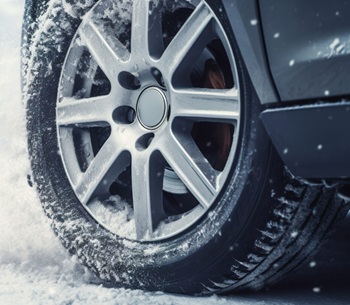 For decades, concerns about automobile pollution have focused on what comes out of the tailpipe. Now, researchers and regulators say, we need to pay more attention to toxic emissions from tires as vehicles roll down the road. At the top of the list of worries is a chemical called 6PPD, which is added to rubber tires to help them last longer. When tires wear on pavement, 6PPD is released. It reacts with ozone to become a different chemical, 6PPD-q, which can be extremely toxic — so much so that it has been linked to repeated fish kills in Washington state. The trouble with tires doesn’t stop there. Tires are made primarily of natural rubber and synthetic rubber, but they contain hundreds of other ingredients, often including steel and heavy metals such as copper, lead, cadmium, and zinc. more, >>CLICK TO READ<< 17:07
For decades, concerns about automobile pollution have focused on what comes out of the tailpipe. Now, researchers and regulators say, we need to pay more attention to toxic emissions from tires as vehicles roll down the road. At the top of the list of worries is a chemical called 6PPD, which is added to rubber tires to help them last longer. When tires wear on pavement, 6PPD is released. It reacts with ozone to become a different chemical, 6PPD-q, which can be extremely toxic — so much so that it has been linked to repeated fish kills in Washington state. The trouble with tires doesn’t stop there. Tires are made primarily of natural rubber and synthetic rubber, but they contain hundreds of other ingredients, often including steel and heavy metals such as copper, lead, cadmium, and zinc. more, >>CLICK TO READ<< 17:07
Biden administration plans to tee up offshore wind across the nation’s coastlines
 The Biden administration is planning to boost offshore wind energy production, announcing up to a dozen opportunities for industry to bid on chances to build wind turbines in U.S. oceans over the next five years. Interior Secretary Deb Haaland is slated to announce the lease sales at a conference in New Orleans. The 12 potential opportunities Haaland is announcing include sales in the central Atlantic Ocean, Gulf of Maine, Gulf of Mexico, the New York Bight and off the coast of Oregon, California, Hawaii and a yet-to-be-determined U.S. territory. These sales were described as potential sales that could occur rather than ones definitely slated to happen, and if former President Trump wins election, he may want to cancel them. more, >>CLICK TO READ<< 14:56
The Biden administration is planning to boost offshore wind energy production, announcing up to a dozen opportunities for industry to bid on chances to build wind turbines in U.S. oceans over the next five years. Interior Secretary Deb Haaland is slated to announce the lease sales at a conference in New Orleans. The 12 potential opportunities Haaland is announcing include sales in the central Atlantic Ocean, Gulf of Maine, Gulf of Mexico, the New York Bight and off the coast of Oregon, California, Hawaii and a yet-to-be-determined U.S. territory. These sales were described as potential sales that could occur rather than ones definitely slated to happen, and if former President Trump wins election, he may want to cancel them. more, >>CLICK TO READ<< 14:56
Wind Energy off Morro Bay Faces Fisher Lawsuit and Marine Sanctuary Issues
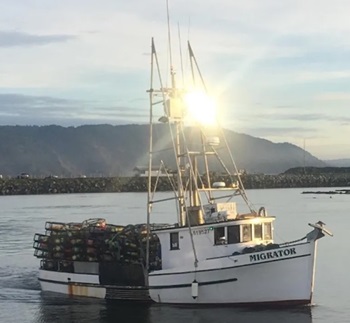 Three new wind farms in the waters north of Santa Barbara County have run into a few obstacles in their attempts to bring offshore wind to the Central Coast. On top of discussions with government agencies and the Northern Chumash tribe, the three developers face a lawsuit from two San Luis Obispo fisheries claiming that “best practices” are not being used in the process of approving and building off the coast of Morro Bay. The lawsuit was filed by the Morro Bay Commercial Fishermen’s Organization (MBCFO) and the Port San Luis Commercial Fishermen’s Association, who claim that the equipment used to survey underwater land for offshore wind development could be harmful, and possibly deadly, to sea animals in the area. They added that this would infringe on the fishermen’s right to fish and be detrimental to the commercial fishing industry in all of California. Photos, charts, more, >>CLICK TO READ<< 09:50
Three new wind farms in the waters north of Santa Barbara County have run into a few obstacles in their attempts to bring offshore wind to the Central Coast. On top of discussions with government agencies and the Northern Chumash tribe, the three developers face a lawsuit from two San Luis Obispo fisheries claiming that “best practices” are not being used in the process of approving and building off the coast of Morro Bay. The lawsuit was filed by the Morro Bay Commercial Fishermen’s Organization (MBCFO) and the Port San Luis Commercial Fishermen’s Association, who claim that the equipment used to survey underwater land for offshore wind development could be harmful, and possibly deadly, to sea animals in the area. They added that this would infringe on the fishermen’s right to fish and be detrimental to the commercial fishing industry in all of California. Photos, charts, more, >>CLICK TO READ<< 09:50
Crab fishermen test pop-up fishing gear to reduce whale entanglements
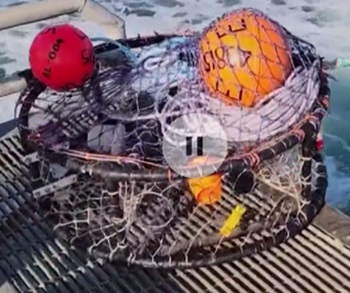 Traditionally, the Dungeness crab fishing season runs from November through June using vertical line fishing gear that spans from the surface to the seafloor. After whale entanglements spiked from 2015 to 2018, the Dungeness crab season has faced delay or closure since 2019. Season closures are affecting the fishing business, but now during this closure, a handful of commercial fishermen such as Brand Little, are testing a whale-safe kind of fishing gear, called “pop-up” or “ropeless” fishing gear, hoping the state will authorize this alternative for use next season, so fishermen can still work. Commercial fisherman Brand Little described how the first test of the spring season went with about 20 fishermen. Video, more, >>CLICK TO READ<< 08:59
Traditionally, the Dungeness crab fishing season runs from November through June using vertical line fishing gear that spans from the surface to the seafloor. After whale entanglements spiked from 2015 to 2018, the Dungeness crab season has faced delay or closure since 2019. Season closures are affecting the fishing business, but now during this closure, a handful of commercial fishermen such as Brand Little, are testing a whale-safe kind of fishing gear, called “pop-up” or “ropeless” fishing gear, hoping the state will authorize this alternative for use next season, so fishermen can still work. Commercial fisherman Brand Little described how the first test of the spring season went with about 20 fishermen. Video, more, >>CLICK TO READ<< 08:59
Some Fishermen Blame California Water Policies for Salmon Season Closures
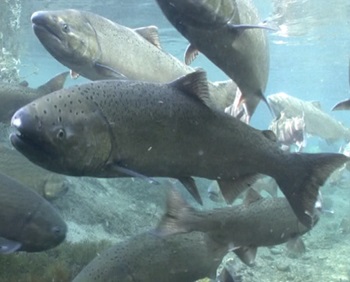 The Pacific Fishery Management Council unanimously recommended the closure of all California commercial and recreational ocean salmon fisheries through 2024, after a similar closure last year, blaming drought, climate and other factors for dwindling stocks. “While incredibly painful to fishing families and fishing communities, the Pacific Coast Federation of Fishermens Associations supports the closure,” said George Bradshaw, president of PCFFA. “We all need to be doing everything we can to give Californias salmon a chance to recover. It has to be an all hands-on deck effort to ensure survival for our Central Valley and Klamath salmon runs.” Video, more, >>click to read<< 09:14
The Pacific Fishery Management Council unanimously recommended the closure of all California commercial and recreational ocean salmon fisheries through 2024, after a similar closure last year, blaming drought, climate and other factors for dwindling stocks. “While incredibly painful to fishing families and fishing communities, the Pacific Coast Federation of Fishermens Associations supports the closure,” said George Bradshaw, president of PCFFA. “We all need to be doing everything we can to give Californias salmon a chance to recover. It has to be an all hands-on deck effort to ensure survival for our Central Valley and Klamath salmon runs.” Video, more, >>click to read<< 09:14
Federal advisory group recommends curtailed Oregon ocean salmon fishing again; closing California season
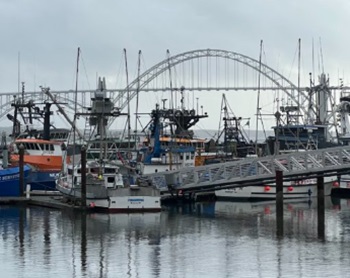 Recommendations for the ocean salmon seasons off the coasts of Oregon, California and Washington were made last week with some OK news for some fishermen and devasting news for those in California. Once again. The Pacific Fishery Management Council — which oversees fishing along the West Coast — voted unanimously Wednesday to once again shut California’s commercial and recreational chinook salmon fisheries through the end of the year. Its recommendations are similar to those made in 2023, which was the first time such a closure occurred in 14 years. Oregon and Washington fared better – but still not very good. more, >>click to read<< 08:18
Recommendations for the ocean salmon seasons off the coasts of Oregon, California and Washington were made last week with some OK news for some fishermen and devasting news for those in California. Once again. The Pacific Fishery Management Council — which oversees fishing along the West Coast — voted unanimously Wednesday to once again shut California’s commercial and recreational chinook salmon fisheries through the end of the year. Its recommendations are similar to those made in 2023, which was the first time such a closure occurred in 14 years. Oregon and Washington fared better – but still not very good. more, >>click to read<< 08:18
California’s ocean salmon fishing season closed for second year in a row
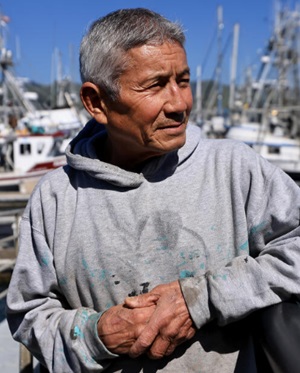 California’s commercial and recreational ocean salmon fishing season is set to be closed for the second consecutive year, another blow to the state’s beleaguered industry suffering from the combined fallout of drought, climate disruption and deteriorating ocean conditions. Already, a new request is underway for yet another federal disaster declaration to help alleviate some of the wide economic damage from the closure, affecting not just the fleet but many associated businesses that depend on the fishery, one of the state’s most lucrative. Many fishermen, already resigned to a severely limited season if any at all due to depleted stocks, had backed the full closure. “For nine months now, we’ll probably be without income. When you look at overall impact, it’s significant. Do we want the closure? Obviously, no. Is it necessary? Yes,” said Dick Ogg, a Bodega Bay commercial fisherman and president of the Bodega Bay Fishermen’s Marketing Association. Photos, more, >>click to read<< 07:43
California’s commercial and recreational ocean salmon fishing season is set to be closed for the second consecutive year, another blow to the state’s beleaguered industry suffering from the combined fallout of drought, climate disruption and deteriorating ocean conditions. Already, a new request is underway for yet another federal disaster declaration to help alleviate some of the wide economic damage from the closure, affecting not just the fleet but many associated businesses that depend on the fishery, one of the state’s most lucrative. Many fishermen, already resigned to a severely limited season if any at all due to depleted stocks, had backed the full closure. “For nine months now, we’ll probably be without income. When you look at overall impact, it’s significant. Do we want the closure? Obviously, no. Is it necessary? Yes,” said Dick Ogg, a Bodega Bay commercial fisherman and president of the Bodega Bay Fishermen’s Marketing Association. Photos, more, >>click to read<< 07:43
Federal Funding Allocated for Salmon Fishing Disaster
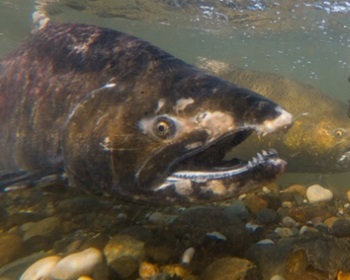 On April 6, 2023, the Pacific Fishery Management Council (PFMC) acted unanimously to recommend a full closure of California’s 2023 commercial and recreational ocean salmon seasons due to extremely low population estimates for Sacramento and Klamath river fall Chinook salmon. Within hours of the recommendation, Gov. Gavin Newsom announced his administration’s request for a federal fishery disaster declaration to support impacted communities. Looking ahead to the 2024 season, the PFMC will consider the alternatives for the 2024 salmon seasons at its meeting April 5-11 in Seattle. This meeting is open to the public. more, >>click to read<< 11:45
On April 6, 2023, the Pacific Fishery Management Council (PFMC) acted unanimously to recommend a full closure of California’s 2023 commercial and recreational ocean salmon seasons due to extremely low population estimates for Sacramento and Klamath river fall Chinook salmon. Within hours of the recommendation, Gov. Gavin Newsom announced his administration’s request for a federal fishery disaster declaration to support impacted communities. Looking ahead to the 2024 season, the PFMC will consider the alternatives for the 2024 salmon seasons at its meeting April 5-11 in Seattle. This meeting is open to the public. more, >>click to read<< 11:45
Toxic Dust Threatens California Salmon Population, Lawmaker Seeks Solution
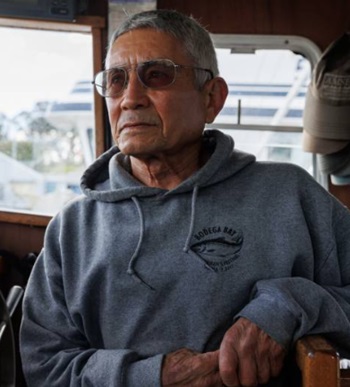 For the first time in more than three decades of fishing for salmon near Bodega Bay, Dick Ogg will motor his white and navy boat, Karen Jeanne, north this summer past his typical fisheries in hopes of finding the multicolored species along the Oregon coast. There aren’t enough salmon left off the California coast for Ogg to sell on Bodega Bay’s historic docks. “We, as fishermen, have nowhere to turn,” he said. Fishery managers are signaling they may cancel California’s commercial salmon season for the second year in a row, which means the 71-year-old has two options: temporarily traveling to Oregon to catch salmon or barely making ends meet luring in rockfish and sablefish. Ogg, often in a gray hoodie and wiry sunglasses, wishes there was a solution for boosting California’s salmon schools. He describes the species as “having one of the greatest spirits” an ocean-fairing creature can have. Photos, more, >>click to read<< 11:34
For the first time in more than three decades of fishing for salmon near Bodega Bay, Dick Ogg will motor his white and navy boat, Karen Jeanne, north this summer past his typical fisheries in hopes of finding the multicolored species along the Oregon coast. There aren’t enough salmon left off the California coast for Ogg to sell on Bodega Bay’s historic docks. “We, as fishermen, have nowhere to turn,” he said. Fishery managers are signaling they may cancel California’s commercial salmon season for the second year in a row, which means the 71-year-old has two options: temporarily traveling to Oregon to catch salmon or barely making ends meet luring in rockfish and sablefish. Ogg, often in a gray hoodie and wiry sunglasses, wishes there was a solution for boosting California’s salmon schools. He describes the species as “having one of the greatest spirits” an ocean-fairing creature can have. Photos, more, >>click to read<< 11:34
Salmon populations are struggling, bringing economic woes for California’s fishing fleet
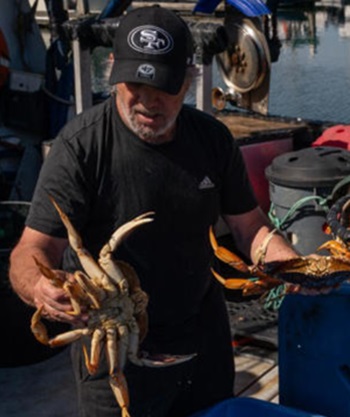 The season typically runs from May to October, but California Chinook salmon populations have declined so severely in recent years that fishery authorities are considering whether to adopt severe restrictions this season or impose a ban on fishing altogether for the second consecutive year. For those whose livelihoods revolve around catching salmon, the shutdown has brought hard times and widespread frustration. “It’s devastating. It’s absolutely devastating,” said commercial fisherman Chris Pedersen. “They’re literally killing the salmon fleet.” Pedersen, who is 64 and has been fishing for salmon since he was a boy, turned to other work over the past year to make ends meet. He has fiberglassed boats, delivered meals and built sheds at a horse ranch. “You’ve got to do whatever you can to live,” he said. Photos, video, more, >>click to read<< 07:48
The season typically runs from May to October, but California Chinook salmon populations have declined so severely in recent years that fishery authorities are considering whether to adopt severe restrictions this season or impose a ban on fishing altogether for the second consecutive year. For those whose livelihoods revolve around catching salmon, the shutdown has brought hard times and widespread frustration. “It’s devastating. It’s absolutely devastating,” said commercial fisherman Chris Pedersen. “They’re literally killing the salmon fleet.” Pedersen, who is 64 and has been fishing for salmon since he was a boy, turned to other work over the past year to make ends meet. He has fiberglassed boats, delivered meals and built sheds at a horse ranch. “You’ve got to do whatever you can to live,” he said. Photos, video, more, >>click to read<< 07:48
Man found dead inside fishing boat that hit rocks near Point Reyes
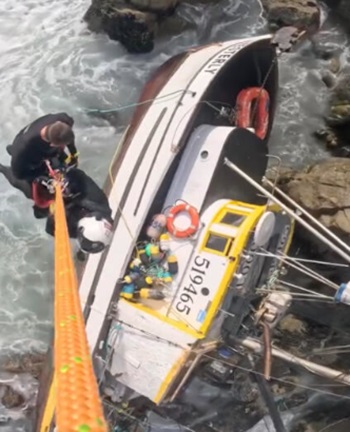 A Half Moon Bay man was found dead after his fishing boat crashed into rocks Thursday afternoon near Point Reyes, officials said. The Coast Guard sent a rescue swimmer to the wrecked boat, The Westerly. The swimmer could see someone inside but could not get into the cabin. The Sonoma County Sheriff’s Office sent rescue helicopter Henry 1 to the boat near Chimney Rock, and a paramedic and tactical flight officer descended by rope onto the boat as waves battered it and it was listing on its side. The damaged boat then began to sink. The helicopter rescue crew broke into the boat’s cabin where they found the man dead. He was later identified as Matthew Paul, 49. The crew extracted Paul’s body and it was airlifted to the Marin County Coroner’s Office, which continues to investigate his cause of death. Video, more, <<click to read<< 11:42
A Half Moon Bay man was found dead after his fishing boat crashed into rocks Thursday afternoon near Point Reyes, officials said. The Coast Guard sent a rescue swimmer to the wrecked boat, The Westerly. The swimmer could see someone inside but could not get into the cabin. The Sonoma County Sheriff’s Office sent rescue helicopter Henry 1 to the boat near Chimney Rock, and a paramedic and tactical flight officer descended by rope onto the boat as waves battered it and it was listing on its side. The damaged boat then began to sink. The helicopter rescue crew broke into the boat’s cabin where they found the man dead. He was later identified as Matthew Paul, 49. The crew extracted Paul’s body and it was airlifted to the Marin County Coroner’s Office, which continues to investigate his cause of death. Video, more, <<click to read<< 11:42
1 person found dead on crashed fishing boat at Point Reyes
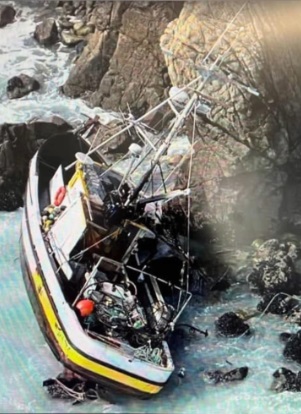 A person was found dead in a crashed fishing boat found by the Sonoma County Sheriff’s Office Helicopter Unit (Henry-1) on Thursday. At around 4:30 p.m., Henry-1 responded to calls of a boat that crashed into the rocky shoreline near Chimney Rock in Point Reyes. A rescue swimmer from the U.S. Coast Guard was deployed and located a person in the boat. However, the swimmer was unable to access the cabin without breaching equipment, the sheriff’s office said. Video, more, >>click to read<< 19:29
A person was found dead in a crashed fishing boat found by the Sonoma County Sheriff’s Office Helicopter Unit (Henry-1) on Thursday. At around 4:30 p.m., Henry-1 responded to calls of a boat that crashed into the rocky shoreline near Chimney Rock in Point Reyes. A rescue swimmer from the U.S. Coast Guard was deployed and located a person in the boat. However, the swimmer was unable to access the cabin without breaching equipment, the sheriff’s office said. Video, more, >>click to read<< 19:29






